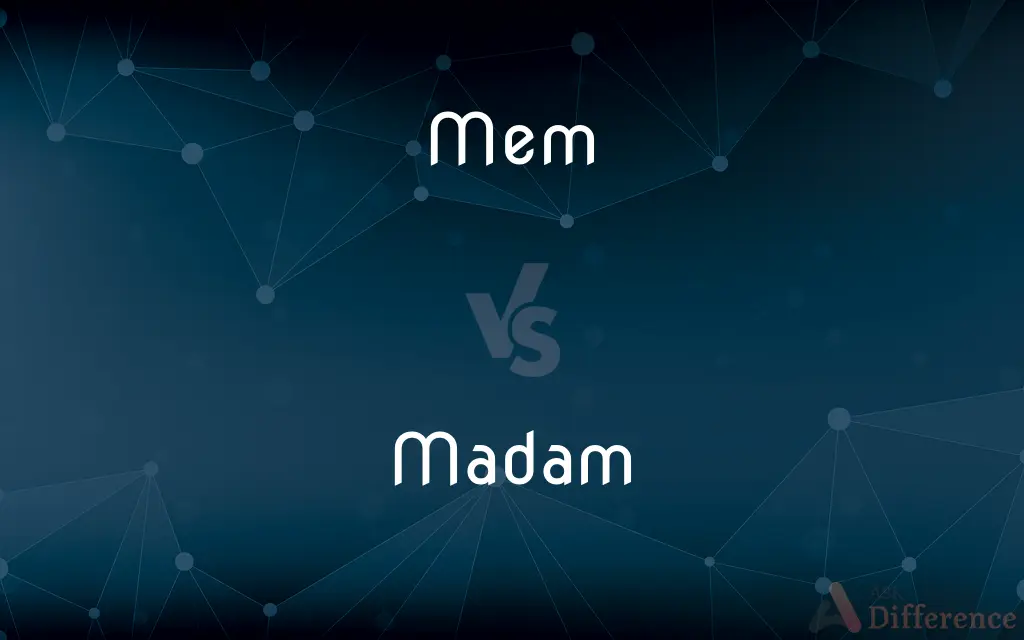Mem vs. Madam — What's the Difference?
Edited by Tayyaba Rehman — By Fiza Rafique — Updated on April 8, 2024
Mem is a respectful term for women in certain cultural contexts, emphasizing formality and distance. Madam, more widely used, denotes respect across various settings but implies a closer or more direct form of address.

Difference Between Mem and Madam
Table of Contents
ADVERTISEMENT
Key Differences
Mem, often found in specific cultural or historical settings, serves as a term of respect for women, especially in parts of South Asia. It carries a colonial undertone, reflecting a formal and somewhat outdated mode of address. Whereas, madam is a more universally recognized term of respect used to address women, especially in formal situations or when the speaker wishes to show deference or politeness.
Mem's usage is relatively niche, limited by geography and context, often associated with the educational and bureaucratic sectors in countries like India and Pakistan. On the other hand, madam has a broader application, spanning from everyday interactions in the service industry to formal communications, and is understood across English-speaking cultures.
The term mem, deriving from "ma'am," which is itself a contraction of "madam," highlights the evolution of language and the remnants of colonial influence in certain areas. Whereas madam has French origins and has maintained its status as a polite form of address for women, regardless of marital status, across various cultures and epochs.
In contemporary usage, mem may be perceived as outdated or overly formal, especially in casual or modern settings. Meanwhile, madam, while still formal, is more versatile, used in both high-end establishments and everyday encounters to convey respect or politeness.
Mem's specific and limited use reflects cultural nuances and the enduring impact of history on language. Madam, with its wider acceptance, underscores the adaptability and universal nature of certain forms of address, illustrating how language evolves while maintaining connections to its roots.
ADVERTISEMENT
Comparison Chart
Cultural Context
Specific to South Asia; colonial roots
Widely used; European origins
Usage
Formal and somewhat outdated
Formal but versatile
Settings
Educational, bureaucratic
Service industry, formal communications
Origin
Derived from "ma'am," a contraction of "madam"
French origins
Contemporary Perception
Often seen as outdated
Regarded as polite and respectful
Compare with Definitions
Mem
A respectful term for women in South Asia.
The students addressed their teacher as mem.
Madam
A term of respect for women, indicating politeness.
Madam, your table is ready.
Mem
Used in formal and colonial contexts.
Mem, may I have a moment of your time?
Madam
Does not imply marital status.
Madam President addressed the crowd.
Mem
Associated with educational sectors.
All the mems in the school attended the meeting.
Madam
Used universally across various cultures.
The letter was addressed to Madam Chairperson.
Mem
Reflects a hierarchical social order.
The clerks were instructed to refer to the supervisor as mem.
Madam
Applies in both formal and casual settings.
Can I help you, madam?
Mem
Implies a distance or formality.
She preferred being called mem, maintaining a professional distance.
Madam
Encompasses a broad range of applications.
Please, madam, follow me to your room.
Mem
Mem (also spelled Meem, Meme, or Mim) is the thirteenth letter of the Semitic abjads, including Hebrew mēm מ, Aramaic Mem , Syriac mīm ܡܡ, Arabic mīm م and Phoenician mēm . Its value is [m].
Madam
Madam (), or madame ( or ), is a polite and formal form of address for women, often contracted to ma'am (pronounced in American English and in British English). The term derives from the French madame (French pronunciation: [maˈdam]); in French, ma dame literally means "my lady".
Mem
The 13th letter of the Hebrew alphabet. See Table at alphabet.
Madam
Pl. Mes·dames (mā-dăm, -däm) Used formerly as a courtesy title before a woman's given name but now used only before a surname or title indicating rank or office
Madam Ambassador.
Mem
The thirteenth letter of many Semitic alphabets/abjads (Phoenician, Aramaic, Hebrew, Syriac, Arabic and others).
Madam
Used as a salutation in a letter
Dear Madam or Sir.
Mem
(computing) A memory access as part of processing.
Madam
Madam Used as a form of polite address for a woman
Right this way, madam.
Mem
The 13th letter of the Hebrew alphabet.
Madam
Madam The mistress of a household.
Mem
The 13th letter of the Hebrew alphabet
Madam
Madam A woman who manages a brothel.
Madam
A polite form of address for a woman or lady.
Mrs Grey wondered if the outfit she was trying on made her look fat. The sales assistant just said, “It suits you, madam”.
Later, Mrs Grey was sitting in her favourite tea shop. “Would madam like the usual cream cakes and patisserie with her tea?” the waitress asked.
Madam
The mistress of a household.
Madam
(colloquial) A conceited or quarrelsome girl.
Selina kept pushing and shoving during musical chairs. The nursery school teacher said she was a bad-tempered little madam.
Madam
(slang) A woman who runs a brothel, particularly one that specializes in finding prostitutes for rich and important clients.
After she grew too old to work as a prostitute, she became a madam.
Madam
An irritable, conceited, or contemptous woman. (used as a general term of abuse).
Madam
(transitive) To address as "madam".
Madam
A gentlewoman; - an appellation or courteous form of address given to a lady, especially an elderly or a married lady; - much used in the address, at the beginning of a letter, to a woman. The corresponding word in addressing a man is Sir; often abbreviated ma'am when used as a term of address.
Madam
The woman who is in charge of a household.
Madam
The woman who is in charge of a brothel.
Madam
A woman of refinement;
A chauffeur opened the door of the limousine for the grand lady
Madam
A woman who runs a house of prostitution
Common Curiosities
How does "mem" reflect cultural nuances?
Mem reflects the colonial history and hierarchical social structures of the regions where it's used.
What is the origin of "mem"?
Mem derives from "ma'am," a contraction of "madam," reflecting colonial influences in South Asia.
Is "mem" still widely used today?
Its use is limited and considered somewhat outdated, mainly found in specific contexts in South Asia.
What contexts is "madam" appropriate for?
Madam is appropriate in a wide range of contexts, from formal to casual, to show respect or politeness.
Does "madam" have different meanings in different cultures?
While its core meaning as a term of respect remains, cultural nuances can influence its use and perception.
Can "madam" be used for unmarried women?
Yes, madam can be used regardless of marital status.
Is it disrespectful to call someone "madam"?
No, calling someone madam is generally seen as a sign of respect.
What is the difference in formality between "mem" and "madam"?
Mem is seen as more formal and somewhat outdated, while madam is versatile but still formal.
Can "madam" be considered old-fashioned?
While formal, madam is not typically considered old-fashioned and is still in common use.
Why might someone prefer "madam" over "mem"?
Due to its versatility, modern relevance, and broader recognition, someone might prefer madam over mem.
Can "madam" be used in professional settings?
Yes, madam is often used in professional settings to address women formally.
Where is "mem" most commonly used?
Mem is most commonly used in educational and bureaucratic sectors in South Asia.
How has the usage of "mem" evolved?
Usage of mem has declined, becoming more of a historical or niche term.
What reflects the broader acceptance of "madam"?
Its use in diverse settings, from service industries to formal titles, reflects broad acceptance.
Is "madam" appropriate in all English-speaking countries?
Yes, madam is widely recognized and appropriate across English-speaking countries.
Share Your Discovery

Previous Comparison
Film vs. Membrane
Next Comparison
Department vs. ServiceAuthor Spotlight
Written by
Fiza RafiqueFiza Rafique is a skilled content writer at AskDifference.com, where she meticulously refines and enhances written pieces. Drawing from her vast editorial expertise, Fiza ensures clarity, accuracy, and precision in every article. Passionate about language, she continually seeks to elevate the quality of content for readers worldwide.
Edited by
Tayyaba RehmanTayyaba Rehman is a distinguished writer, currently serving as a primary contributor to askdifference.com. As a researcher in semantics and etymology, Tayyaba's passion for the complexity of languages and their distinctions has found a perfect home on the platform. Tayyaba delves into the intricacies of language, distinguishing between commonly confused words and phrases, thereby providing clarity for readers worldwide.














































